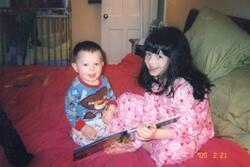Facebook Feminism and Beyond
I have not always called myself a feminist.
Though I have always supported the general, frankly vague, idea of “women's rights,” I never thought that I of all people had to be an advocate for them. I didn't even really understand what rights women around me were being denied. Until high school, I truly thought that the only disparity that American women faced was that we could not participate in Major League Baseball.
And then came Facebook.
This social medium was the first platform that exposed me to the ideas of other women, other young women, about what it meant to want equality, to stand in solidarity with other women, to be aware of patriarchy.
And then came Tumblr.
This underground, teenager-centric, radical social network introduced me to global women's issues, to the erasure of female history, to female sexual empowerment, to intersectional feminism.
Throughout my years of combing social media, upgrading to feminist blogs and newspaper articles, tailoring my internet footprint to fit my growing feminist desires, I developed an identity as a capital-F Feminist. I read and I read and I read. I became accustomed to the bubble of feminist ideology I found on the Internet. I found safety, solidarity, and motivation in these what I read and saw there.
I still do. But I also know that tailoring my internet world to be a feminist space doesn't make the real world any more accepting of women, any more safe for women, and any more willing to hear the female voice.
This year in my AP literature class, only two of the eight works of literature we read were written by women, an improvement from the previous year's zero. This year I have heard my friends who are women gossiping in degrading ways about other girls' decisions regarding body hair, style of dress, and sexuality. This year I have heard my friends who are women fearing that they are being rude to men simply because they disagree with them. I have heard the words “slut,” “whore,” and “bitch” thrown around with reckless abandon. Having taken shelter in an online world wherein I can practically shower in feminist rants and raves, in varying forms of empowerment, I am acutely aware of how different the real world still is and how much work is left to do, even in San Francisco, one of the most progressive cities in the world.
Drenching myself in the words of other feminists has given me a firm belief that everybody should be a feminist. Or, at the very least, that each of us has a responsibility to understand the inequalities and hegemonic power structures in the world around us and to do what we can to demand our rights while understanding where we hold privilege. I can not wave a wand and make everybody into the liberal social justice thinker I am. But I can share my ideas with thousands of people through social media, and any given person can read the post that resonates with them, can find their brand of feminism or activism, can find a way into the movement if they so choose.
When I first started writing for Rising Voices, I was reluctant to share my work. I thought that it made me selfish, self-absorbed, and attention-seeking. But now I see that it's not really about me at all.
For me, feminism began with Facebook.
And I can only hope that for someone else, it can too.
I will feel accomplished if I can write something that inspires someone else to think critically about their own identity, about equality, about social justice, about the nuances of the complex world in which we live. Any advocate, leader, or progressive thinker has to start with a spark of inspiration. That spark has been lit beneath me and through my writing I hope to pass it on.
This piece was written as part of JWA’s Rising Voices Fellowship.







